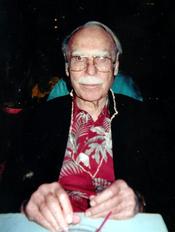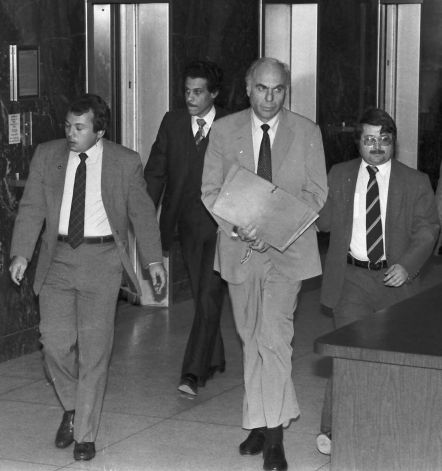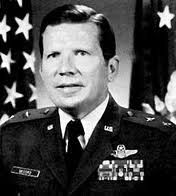Rogues

(Edwin Wilson in retirement. Photo courtesy the Wilson family.)
I got a note from Mac that there were some stories to be told this morning. I will stop by his place this afternoon to hear more, and in preparation I looked up the obit for Edwin Wilson, and did a version of it for the magazine I edit before work. It starts out like this:
“10 September 2012 Edwin Paul Wilson, 84, in Seattle, WA, of complications from heart-valve replacement.”
I don’t know if you remember Ed. He was a towering presence in the business, back in the day, and he paid for his prominence. A trip through his life is a journey through the looking-glass world that Mac tried to clean up in his second intelligence career at the Community Management Staff in the wake of the Pike and Church Congressional committee investigations of an out-of-control clandestine government.
Travel along with me this morning and see if you recall some of the context of the times. It includes secret wars in Laos and SE Asia, rogue Green Berets in Libya and all sorts of connections to groups like the Contras in Central America.
Ed Wilson was born May 3, 1928, in rural Nampa, Idaho. He worked as a merchant seaman before attending the University of Portland, where he received a bachelor’s degree in psychology in 1953. He was an outsized presence from the beginning of his career. As a strapping 6’4” Marine, he fought in the waning days of the Korean Conflict and was recruited by the six-year-old Central Intelligence Agency, joining the clandestine service the day after his discharge in 1955. Early assignments for the Agency included duty in Western Europe reporting on labor unrest.
He worked officially for the CIA from 1955 until 1971, and then ostensibly for the Office of Naval Intelligence until 1976.
Wilson developed a specialty in establishing and managing commercial “front companies” to facilitate covert operations similar to the Agency’s Vietnam-era “Air America” corporation that performed special services for the Other Government Agency.
Upon leaving government service as a Navy civilian, he entered the arms business in what he claimed later was an informal but real relationship with the Agency. In the process of brokering deals, he made a significant personal fortune as a quasi-civilian. Moammar Qaddafy was one of several clients served by his Consultants International office on 22nd St. NW. He enjoyed entertaining on his 2,500 acre estate in Fauquier County’s hunt country and relaxing at his seaside villas on Libya’s Mediterranean cost.
In his heyday, the Washington Post claimed he was worth $23 million dollars, though his high-flying career came crashing down when he was branded a traitor by his former employers. His arrest came in 1982 after being lured from the safety of his Libyan villa to the Dominican Republic, where he was arrested and transferred to the United States. He was convicted in Texas in 1983 for shipping 20 tons of C-4 plastic explosives to Libya, the largest arms transfer case in history at that time, and an amount of explosives equal to the entire domestic stockpile at the time.

(Edwin Wilson leaves Federal Court. Photo AP.)
Wilson was emblematic of the “rogue operative.” Other contemporaries included notorious financier Robert Vesco, who fled US jurisdiction for Cuba in 1982, and USAF Major General Richard Secord, convicted in 1989 of complicity in shipping arms to Iran. Secord’s conviction was overturned in 1992.

(Major General Richard Secord on active duty. USAF Photo.)
Wilson maintained that Secord was a “silent partner” in one of his companies, although the General strongly denied this allegation. Nonetheless, Wilson and other retired CIA officers were alleged to be working with Secord when Lt. Col. Oliver North of the National Security Council approached him to ask for help in buying arms for the Nicaraguan Contras, opponents of the Sandinista regime in Managua.
Secord maintained that there was no relationship, but there was a lot of that going around at the time.
Ed Wilson was tried four times on charges related to his business activities. In addition to the Libyan explosives charges, he was acquitted of soliciting the assassination of a Libyan dissident, convicted of Virginia weapons violations and accused in New York of soliciting the murder of two prosecutors, his ex-wife and witnesses against him.
Wilson maintained his innocence for the rest of his life. Throughout his two decades in Federal custody- most of it spent in solitary confinement- he harnessed the Freedom of Information Act to obtain internal CIA documents that suggested that he had continued an informal relationship with the Agency. In 2003, a federal judge in Texas ruled that evidence tampering likely precluded acquittal on the original explosives charges.
He was released from prison in September of 2004. Having declared bankruptcy, Wilson’s remaining years were spent subsisting on Social Security and his CIA pension with his brother in Edmonds, Washington.
In its obituary of the colorful rogue, the Washington Post quoted CIA expert David Corn as having found irony in the sordid tale. “They framed a guilty man,” Corn said in an interview in 2004. “I think he’s a terrible fellow who got what he deserved, but they did frame him.”
Survivors, include his long-time companion, Cate Callahan; two sons, Karl and Erik Wilson; and a sister. Graveside services are going to be held this morning at the Veterans Administration Tahoma National Cemetery in Kent County, WA.
I don’t know quite what to think about the legacy of his life. It was larger than most. I don’t know enough to say whether he was a rogue, or a gently guided missile harnessed with “plausible deniability.”
Presidents seem to like that. At least when it is necessary. Like Mission Impossible, the Secretary will disavow all knowledge, too, if that is the way it works out.
Copyright 2012 Vic Socotra
www.vicsocotra.com
